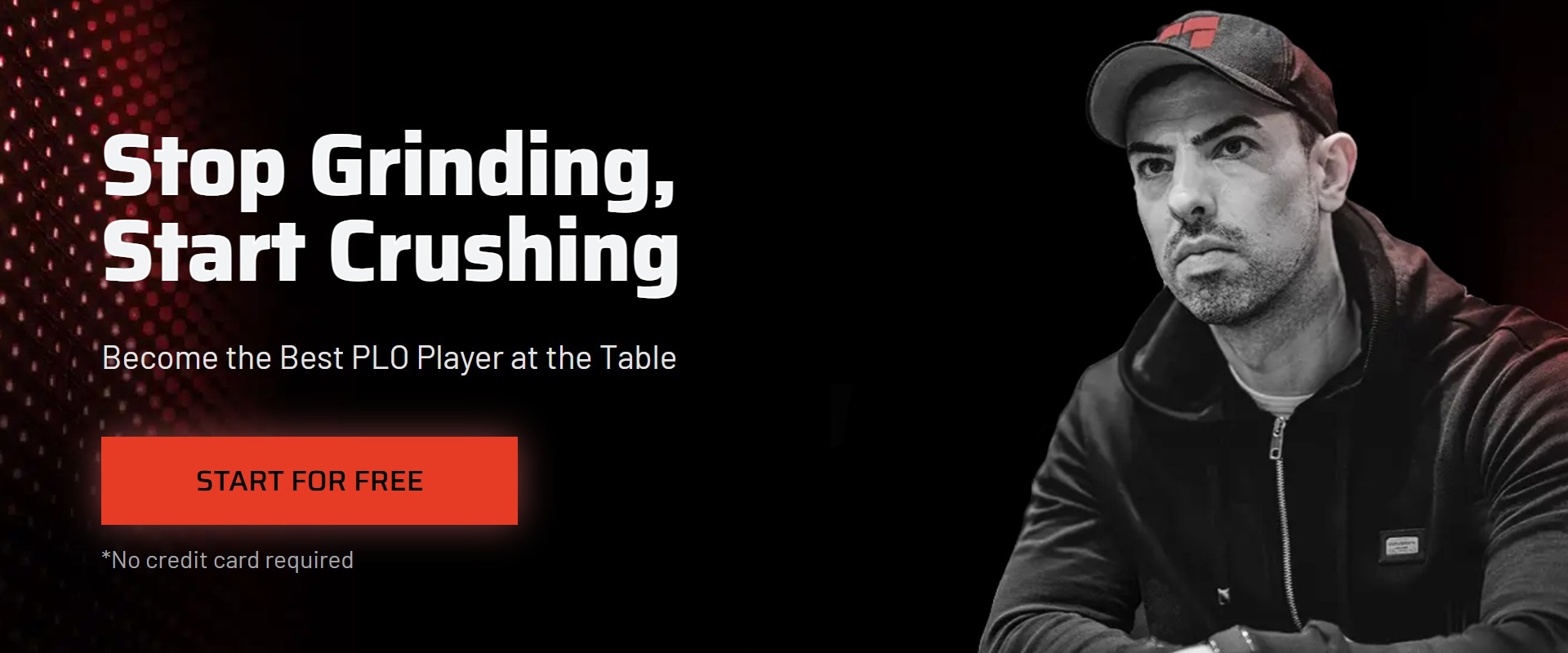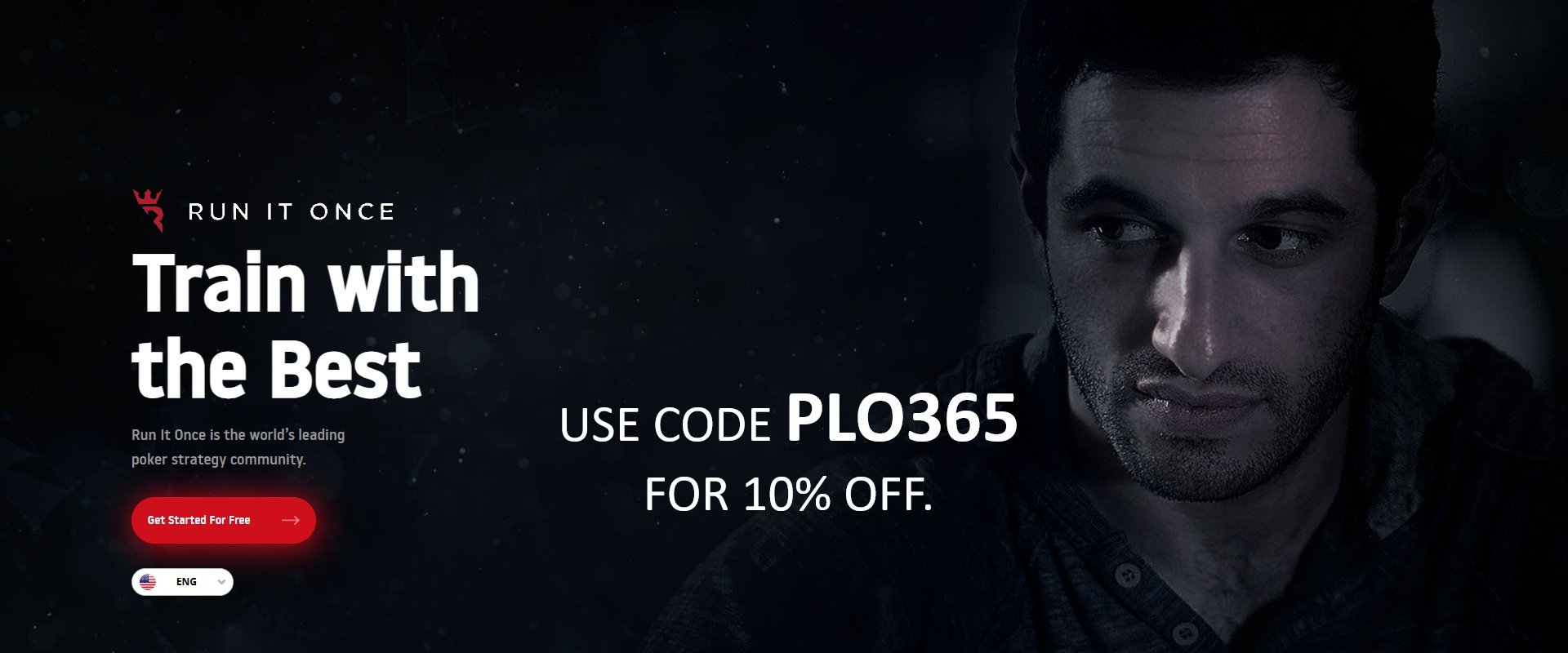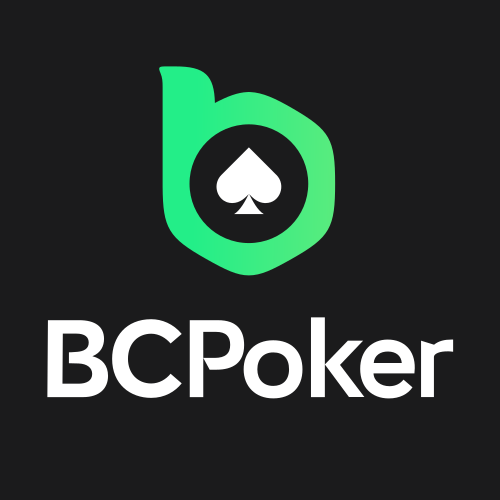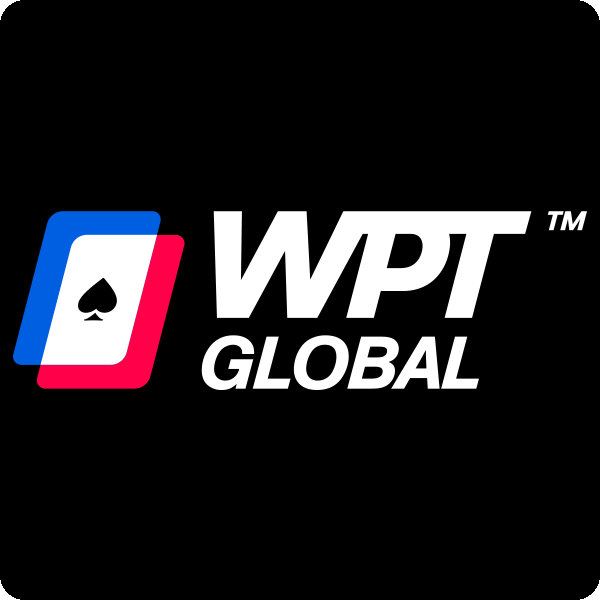The Ultimate Pot Limit Omaha Guide for 2025

Key takeaway: You’ll learn clear PLO poker rules, how Pot Limit Omaha differs from Hold’em, a street‑by‑street playbook, PLO starting hands, wraps and “nuttiness,” a sensible approach to variance and bankroll, the exact tools I recommend, and a clean 30‑day study path with PLO Mastermind to learn all aspects of Pot Limit Omaha in one month or less.
Introduction to Pot Limit Omaha
Pot Limit Omaha (PLO) is a community‑card game where you get four hole cards, you must use exactly two of them, and you combine them with exactly three community cards to make your final five‑card hand. Betting is “pot‑limit,” which means the maximum bet or raise you can make is capped by the size of the pot at that moment.
The structure creates bigger pots, more draws, and tougher postflop decisions than Hold’em. That’s why PLO is so fun—and so punishing if you wing it.
Best Omaha Poker Sites and rakeback deals
BCPoker NEW
Best Crypto Poker App
$200 Bonus + up to 50% rakeback
Incredibly Soft Action
WPT Global
Free Tournament tickets up to $480
Free Casino Coin up to $100
30% Rakeback
Network: Independent
Phenom Poker
up to 35% Rakeback
Soft Action
Network: Independent
Juicy Stakes Poker
36% Rakeback
Spin & Gos with up to 12,000x your Buy-in
Network: Horizon Poker
Champion Poker
Network: iPoker
Why beginners struggle at first
- The two‑from‑hand rule feels unnatural to NLHE converts. You can’t “play the board,” and you can’t make a flush without two suited cards in your hand.
- Average showdown strength is higher. In many pots the winner shows a straight, flush, or full house rather than one pair or two pair.
- Pot‑limit sizing confuses people. The max raise changes with every action. You calculate it from the current pot plus bets to call (we’ll walk through a simple example below).
What makes Pot Limit Omaha worth your time
- More action comes from closer equities. Weak players chase too many second‑best draws and pay off too many rivers. That’s your edge.
- Good decisions in position pay fast. Position improves your ability to realize equity, control pot size, and value bet thinly. It matters even more in PLO than in Hold’em.
- There’s real skill in “nuttiness.” You’ll learn to bias your range toward nut straights and nut flushes, and to avoid draws that cap out as second-best hands.
Common misconceptions (let’s squash them)
- “It’s all gambling.” No. Pot Limit Omaha rewards planning around board texture, nut potential, and equity realization. Sloppy play gets destroyed across four streets.
- “AA dominates like in Hold’em.” Bare aces without connectivity or suits will let you down in multiway pots. You need support cards or position—or both.
- “I can fake it and represent the nuts.” On many boards, someone actually has it or has a huge redraw. Bluff less, pick better blocker combos, and attack nut‑changing turns.
How to read this guide
- First, get the PLO poker rules and the Hold’em comparison tight.
- Then learn the core Pot Limit Omaha strategy: PLO starting hands, position, wraps, and nuttiness.
- Finish with the playbook, common mistakes, tools, and the 30‑day study plan.
If you do one thing today, make it this: repeat “two from hand + three from board” until you can’t get it wrong. Every other skill is easier once that’s automatic.

Pot Limit Omaha vs Texas Hold’em: the deep comparison (and what to change if you’re an NLHE player)
PLO and Hold’em use the same hand rankings, but the way you build hands and pressure pots is different. You get four hole cards in PLO. You must use exactly two of them in your final hand. Betting is capped by the pot, not your stack. As a result, equity runs closer, hands at showdown are stronger, and multiway pots are common.
Check out the key differences between PLO and Texas Hold’em.
Key differences between PLO and Texas Hold’em
| Topic | Texas Hold’em | Pot Limit Omaha | Notes |
|---|---|---|---|
| Hole cards | 2 | 4 | More combos, more draws, richer postflop trees |
| Hand construction | Any 5 from 7 | Exactly 2 from hand + 3 from board | Never forget this rule |
| Betting | No‑limit | Pot‑limit | Max raise equals pot size |
| Equity spread | Wider | Closer | Skill edge shifts postflop |
| Board coverage | Narrow | Wide | You’ll face more nutted hands |
| Bluffing frequency | Higher | Lower | Big bets often weighted to strength |
| Position value | High | Very high | Equity realization drives EV |
| Variance | High | Higher | Build a bigger bankroll |
- Hole cards
- Hand construction
- Hold’em: any five from seven (2 hole cards + 5 from the board)
- Pot Limit Omaha: exactly 2 hole + 3 board. No single‑card flushes or “play the board” tricks.
- Betting structure
- Hold’em: usually no‑limit
- Pot Limit Omaha: pot‑limit. Max bet equals the current pot size after accounting for calls.
- Typical winning hands
- Hold’em: top pair, two pair show up often
- Pot Limit Omaha: more straights, flushes, and boats get shown. Second‑best hands lose a lot of money here.
- Variance
- Hold’em: medium
- Pot Limit Omaha: higher. Closer equities collide across more streets, and more players see turns and rivers.
How NLHE instincts get you in trouble
- Overvaluing two pair and non‑nut flushes. These are landmines in PLO, especially multiway.
- Ignoring position. In Pot Limit Omaha, in‑position players realize more equity and punish capped ranges at higher rates.
- Bluffing too often. Board coverage is wide; people show up with real hands and redraws. Choose blocker‑based bluffs on the right turns and rivers, and trim the rest.
Your upgrades
- Build ranges that make the nuts (and redraws to better nuts). Prefer double‑suited, connected hands with top‑end straight coverage.
- Bet larger on wet boards where you have the nut advantage. Protect equity and charge second‑best draws.
- Respect big river bets unless you have strong blockers or a clear read. Pools skew strong on big rivers, especially at small stakes.
Key takeaway: Think nuttiness, position, and pot‑limit math. If you force those habits early, you skip months of pain NLHE regulars create for themselves in PLO.
PLO poker Rules: the detailed version
Game flow
- Blinds posted, four hole cards to each player, preflop betting starts left of the big blind.
- Flop (3 cards), turn (1 card), river (1 card) with a betting round after each street.
- Showdown if needed; highest five‑card hand wins under standard rankings.
Hand construction
- You must use exactly 2 hole cards and exactly 3 community cards. No exceptions.
- Flushes require two suited cards in your hand and three suited on board. One suited hole card does not make a flush in Pot Limit Omaha.
- Straights often look tricky. Always check whether your straight is the top end or a second‑best that will get stacked.
Betting structure: pot‑limit
- Minimum bet is the big blind; maximum bet or raise equals the current pot size after you account for calls.
- Example: Pot is $20. Player A bets $20. Player B’s max raise is $20 (pot) + $20 (bet) + $20 (call) = $60, plus the $20 call, so the raise can go to $80 total.
- Betting runs preflop, flop, turn, and river with the same pot‑limit cap each time.
Showdown notes
- Standard rankings apply: high card up to royal flush.
- Winners must show two hole cards and three community cards in their final hand. Ties split.
- In multiway all‑ins, side pots are created and paid out in order.
Why these PLO poker rules matter
- The two‑from‑hand rule drives every decision. It changes which draws are real, which blockers work, and which “obvious” lines from Hold’em become expensive mistakes .
Pot Limit Omaha Strategy: fundamentals you’ll use every session
Core principles
- Play for the nuts. Draw to nut straights and flushes. Second‑best draws go broke in PLO because so many pots are multiway.
- Coordination beats “one‑card heroes.” Value hands where all four cards work together: connected, high, and preferably double‑suited.
- Position is king. You bet for value and protection more cleanly and you realize equity more often when you act last.
- Control pots with medium strength. Use smaller sizes or checks when your hand is capped or vulnerable on dynamic textures.
- Semi‑bluff better, pure bluff less. Make bluffs carry equity and blockers. Pure air finds more callers in Pot Limit Omaha.
- Accept variance. It’s a swingy game. You need a tighter session plan and a sturdier bankroll than in NLHE.
Hand categories to favor
- Double‑suited AA with connectivity (AAKQds, AAJTds), big rundowns (KQJTds, QJT9ds), and strong Broadway combos. These make nut straights and nut flushes often.
- Hands with few or no “danglers.” Danglers are cards that don’t work with the rest. Fewer danglers, more options postflop.
Hands to be wary of
- Bare aces or small pairs with no support. They look pretty in the lobby and ugly on most flops.
- Low, gapped, and rainbow junk. If it can’t make the nuts or good redraws, it belongs in the muck.
Adjusting to opponents
- Versus loose callers: value bet bigger and more often. Bluff less.
- Versus tight players: take stabs on safe textures, use blockers, and target capped lines.
Key takeaway: Prefer hands that can win nut‑to‑nut and avoid draws that cap out as second best. You’ll be surprised how fast your red line and your blue line both improve.
PLO Starting hands for beginners: what to play, what to pass
What a good Pot Limit Omaha hand looks like
- Coordination: Cards connect to form straights on common boards. JT98, QJT9, KQJT are premium because they hit wraps often.
- Suitedness: Double‑suited hands create two flush possibilities and often include the ace of a suit for nut coverage.
- High cards: Broadway cards make top‑end straights and higher full houses. They also give you better top two when boards pair.
Premium categories and why we like them
- AAxx double‑suited with connectivity: AAKQds, AAJTds. These hands can 3‑bet, isolate, and continue on many flops because they have nuttiness and backup draws.
- Rundowns: JT98ds, T987ds, QJT9ds. These hands make wraps constantly and pair well with two‑tone or three‑straight boards.
- Big double‑suited Broadway: KQJTds is a parade of nut straights and nut flushes.
Borderline hands in position
- Single‑suited high rundowns can be playable when stacks are deep and you have position. Watch for the “second‑best flush” problem against multiway fields.
- One dangler is tolerable if the other three cards sing. Two danglers? Fold more, especially out of position.
Hands that look nice but lose money
- Bare aces (like AA72 rainbow). Without suits and connectivity, you’ll whiff a lot and hate calling bets. Multiway, this hand shrinks fast.
- Small pairs with no help (7722r). You don’t “set mine” well in Pot Limit Omaha unless the rest of the hand supports nuttiness or redraws.
- Triple‑suited hands. You can only use two cards. That third suit reduces your quality and tricked many wallets already.
Position‑based selection
- Early position: play the top of your range. Tight, connected, and suited. Your mistakes get magnified out of position.
- Middle position: add a few more suited rundowns and strong Broadway combos.
- Button: open the most. You realize equity best here, so you can add more single‑suited and lightly gapped rundowns.
- Blinds: defend selectively. Prioritize hands with nut flush potential and top‑end straight coverage against small opens; fold the loose, low junk.
Exploit tips
- If the table is splashy and sticky, avoid second‑best flushes and thin two‑pair lines. Value big and keep your bluffs clean.
- Tight table with low aggression? Steal more from late position and c‑bet small on static boards where ranges are capped.
Key takeaway: Four cards should talk to each other. If they don’t, fold and wait for the ones that do.
PLO Preflop strategy: raise sizes, 3‑bets, squeezes, and real defense
Your default goals @ PLO preflop are
- Enter pots with hands that play well postflop. Good Pot Limit Omaha pots are won on the flop and turn with equity and position.
- Raise first‑in rather than limp. You want initiative and a narrower pot against weaker holdings.
- Tighten ranges out of position. Add hands on the button that make nut straights and flushes.
3‑betting and 4‑betting
- 3‑bet for value with AAxx when you have suits and connectivity, with double‑suited premium rundowns, and with big Broadway double‑suited. These hands keep their equity well across many flops.
- Avoid 3‑betting trashy bare aces just to be “aggressive.” Multiway pots punish those hands.
- 4‑bets should be rare and mostly value at small stakes. Add a few blocker‑driven bluffs against aggressive opponents when you have aces or other strong blockers and playability.
Squeeze play concepts
- Identify loose opens and wide callers behind. If you can push the caller out and play heads‑up in position, your squeeze has teeth.
- Squeeze with hands that hold equity well when called: AAxx with support, strong double‑suited Broadway, and the best rundowns.
- Skip the squeeze when the field won’t fold and your hand plays badly multiway. Squeezing junk into three callers is a fast way to donate.
Defending vs aggression
- Decide between call, fold, and 4‑bet based on hand quality, position, and stack depth. You’re not “supposed” to defend everything; PLO postflop trees punish wide, out‑of‑position calls.
- Use minimum defense frequency concepts sparingly preflop and more on later streets. Your goal in PLO is not “never fold,” it’s “realize equity with the right hands”.
- Plan your stack‑to‑pot ratio (SPR). If a 3‑bet pot will create a low SPR, pick hands that can commit profitably on many flops (top‑end wraps, nutted draws, AAxx with backup).
Tournament tweaks
- Short stacks favor hands that realize fast: high cards, suited aces, and simple top‑pair + redraw combos. Deep stacks favor connectedness and redraws.
Key takeaway: Raise or fold first‑in, 3‑bet with hands that can barrel profitably, and defend hands that realize equity in position. Keep preflop clean and your postflop gets easier.
PLO Postflop play: texture, sizing, and when to push or pump the brakes
Start with the board
- Dry boards: disconnected, rainbow. You can c‑bet smaller and often get immediate folds. Thin value shows up more here.
- Wet boards: connected and often two‑tone. Straights and flushes develop fast. Use bigger bets when you have the nut advantage to price out second‑best draws.
- Paired boards: full houses live rent‑free here. If you’re drawing on a paired board, make sure you have plans for rivers that boat up villains.
Bet sizing patterns that print
- Small bets on static textures to pressure high‑card whiffs and deny equity to backdoors.
- Big bets on draw‑heavy textures when your range is nutted or semi‑nutted. You charge wraps and flush draws properly and simplify later decisions .
- Use checks when capped. Your bluff rate should drop on multiway boards where ranges are strong and equity runs close.
Drawing vs made hands
- Nut draws with backup (pair + nut wrap + nut flush draw) are monsters. They’re often favorites versus sets on the flop in Pot Limit Omaha.
- Non‑nut draws lose heaps. If your straight gets dunked on by a higher straight, your “outs” are fake outs.
- Sets on wet, two‑tone, connected boards should proceed with caution unless you have key redraws or blockers. The turn changes nut order fast.
Turn and river play
- Good double‑barrels: turns that help your nut story or kill villain’s bottom end. Bad ones: board pairs that improve villain’s boats and crush your draw.
- Out of position, block bets on rivers can set your price and stop a shove. It’s a real tool at low and mid stakes and it works well when ranges are capped.
- Hero‑fold discipline: big river bets at small stakes are value‑heavy. Call with top blockers and clear winners; fold more of the second‑best club. Your bankroll will thank you.
Multiway navigation
- Value goes up, bluffs go down. With extra players, someone often has a strong piece. Charge draws and avoid fancy plays.
- Position is amplified. In position, you take more free cards, control pot size, and name your price on rivers.
Key takeaway: Read texture first, then read your hand. Put big money in when you have the nut advantage or nuclear equity. Keep pots small with capped hands and second‑best draws.
Advanced concepts you’ll use right away
Blockers and removal
- A blocker is a card in your hand that reduces the combinations your opponent can have. The ace of a suit blocks nut flushes; the key straight card blocks the nuts on certain boards.
- Use blockers to pick bluff spots on nut‑changing turns and rivers. It’s more effective than bluffing blind into wide board coverage.
- When blockers don’t help: multiway pots where someone often still has it, and on boards where the nut set of hands is too wide for your single card to matter.
Range construction
- Preflop, aim for ranges that hit top‑end straights and nut flushes often. That gives you postflop lines with pressure and value.
- Postflop, understand range advantage. On KQJ two‑tone, the 3‑bettor in position often has more top‑end straights and nut flush draws; that player earns the right to bet larger and more often.
- Polar vs condensed ranges: On wet boards with nut advantage, polarize with big bets. On dry, static boards, condensed ranges bet small and often.
Population tendencies and how to punish them
- Recreational players misjudge pot odds and call down too light on many textures. Value bet more, bluff less. Yes, it’s that simple and that profitable.
- Overfolders exist too. Against them, pick more bluffs with strong blockers and push them off capped lines.
- Table selection matters. Fewer sharps, more callers equals a simpler, more profitable Pot Limit Omaha strategy: bet your value and skip the fancy stuff.
Mindset and bankroll
- Variance is higher in PLO. You’ll live through downswings even when you play well. Plan a bigger bankroll than in Hold’em and keep your session reviews tight.
Key takeaway: Lean on blockers for better bluffs, value bet more than you think at small stakes, and respect how much variance PLO will throw at you.
Poker training and poker tools stack
Use a small, focused stack while you learn.
- PLO Genius (study and solve): Use it to drill PLO4 and PLO5 spots with feedback and structured reps. It’s designed for Omaha from the ground up, which keeps your practice close to what you’ll see in games.
- Free Pot Limit Omaha Calculator (quick equity checks): Check hand vs hand and range vs range in seconds. Use it after sessions and during study to calibrate your intuition.
- DriveHUD (play and review): Track sessions, see simple HUD stats, and filter big hands for review. That feedback loop fixes leaks faster than guesswork.
- Jurojin Poker (multi‑tabling flow): Clean table management and hotkeys help you add volume without punting.
Key takeaway: PLO Genius for reps, the free calculator for equity intuition, DriveHUD for feedback, and Jurojin to add stable volume. That’s plenty to start with 🙂
Learning resources: the PLO Mastermind 30‑day course

PLO Mastermind currently offers the best 30-day Pot Limit Omaha learning course. Check out what it includes:
- A 30‑day, step‑by‑step study plan for new and small‑stakes Pot Limit Omaha players, available for both PLO4 and PLO5. It combines short video lessons, targeted drills, and community support.
- It runs on PLO Trainer App and gives you preflop ranges plus 300 solved flops with turn and river nodes for many boards. You can train single node, random boards, or multi‑street to match how you learn.
- You also get a clear daily progression, so you never wonder what to study next.
What you’ll study across the 30 days
- Preflop fundamentals (hand selection by position, open/defend/3‑bet plans), and then postflop play in single‑raised pots, 3‑bet pots, and some 4‑bet trees.
- Board texture reading, wraps and nut draws, bet sizing choices, and equity realization. Lessons are concise and practical, so you can practice immediately.
- Built‑in review days so concepts stick. You track progress and see weak spots inside the Trainer.
The tool you’ll use daily: PLO Trainer App
- Over one million flop solutions with turn/river for available flops, preflop training for 6‑max cash, and three practice modes: Single‑Node, Random‑Board, and Multi‑Street.
- A range matrix and hand strength visualization that make “what does good play look like here?” much easier to answer.
- Real‑time feedback so you correct errors and reinforce patterns fast.
Community support
- Join the Mastermind Discord to ask coaches and peers questions, post hands, and keep yourself accountable. That community layer keeps you moving for the full 30 days.
Expected outcomes in a month
- You’ll have a working preflop plan, stronger board reads, and a base set of postflop patterns. You’ll also know how to study on your own with software rather than guessing.
Key takeaway: If you want a single, structured path for month one, this is it. Videos to explain, software to drill, and a community to keep you honest and on track!
The PLO Wrap and nuttiness: your two big PLO superpowers
Omaha Wraps defined
- A PLO wrap is a straight draw with more than eight outs. Pot Limit Omaha hands produce 13‑out and even 17‑out wraps on many flops. That’s why combo draws are so strong.
- Count your outs, but then ask which are nut outs. Outs that make a second‑best straight are fake hustle.
Nuttiness explained
- Nuttiness means how often your hand makes the best possible hand by the river. In multiway pots, non‑nut draws and second‑nut flushes bleed stacks. Filter your decisions with this idea and your results stabilize faster.
Drills you can run
- Take a flop, name the nuts, count your outs, then label nut vs non‑nut. Repeat daily until it’s automatic.
- Practice pair + nut wrap + nut flush draw combos in the free calculator to see how big your equity gets against made hands.
Key takeaway: Count clean outs, not “any outs.” The difference is your win rate
10 classic beginner mistakes (and quick fixes)
- Overvaluing two pair and sets on wet boards. Fix: control pot size or fold when heat comes multiway, unless you have redraws and blockers.
- Calling down with non‑nut flushes. Fix: without the ace or key blockers, fold early, especially multiway.
- Ignoring position. Fix: tighten early, widen on the button; your equity realization needs help.
- Overplaying bare aces. Fix: prefer AA with suits and connectivity .
- Miscounting wraps. Fix: train nut‑out recognition; demote K‑high wraps into A‑high straights.
- Limping first‑in. Fix: raise or fold to keep initiative and set up profitable c‑bets.
- Bluffing like it’s Hold’em. Fix: pick blocker‑heavy bluffs on nut‑changing turns; bluff less overall.
- Sizing errors with pot‑limit. Fix: rehearse pot‑size math (say it out loud at first).
- Failing to exploit stations. Fix: value bet more, bluff less. It’s that simple .
- Underestimating variance. Fix: plan a bigger bankroll and a firm review habit.
PLO variance, formats and bank roll management
Why variance spikes in Pot Limit Omaha
- Equities are closer, more draws collide, and many pots go multiway. Swings last longer even if your Pot Limit Omaha strategy is solid.
Bankroll thought process
- Hold more buy‑ins than you would for NLHE and plan shot rules in advance. Your goal is staying in your best game while you learn and adjust.
- Session control: define stop‑loss and tilt triggers. Review your biggest pots after every session to catch leaks quickly.
Check out our PLO bankroll management guide.
Live vs online
- Live games run slower with bigger pots and many callers, which rewards straightforward value lines. Online runs faster, so use your HUD to identify who won’t fold and who overfolds, then adjust.
Key takeaway: Expect swings and respect them. A larger bankroll and tight reviews keep you in the game long enough to let your edge show.
Your PLO learning game plan: the PLO Mastermind approach

Why this plan works
- It gives you a structure so you don’t waste time wondering what to study. You get 25 short videos, clear daily tasks, and drills inside the Trainer. You also get 300 solved flops with turn/river nodes, which is far more than most beginners will touch in a year.
- It uses real‑time feedback. You don’t just “watch Pot Limit Omaha strategy,” you make decisions, see if they match the solution, and fix them on the spot.
- It’s designed for small‑stakes PLO. The content matches the games you actually play right now.
How to run your 30 days
- Time budget: 60–120 minutes per day, five to six days per week. That’s realistic for working adults.
- Every study day:
- Watch the assigned lesson inside the 30‑day plan (10–20 minutes).
- Drill the exact spot in the PLO Trainer App (20–40 minutes). Use Single‑Node for c‑bet/defend reps, Random‑Board to build pattern recognition, and Multi‑Street when you’re ready.
- Log two to three hands from play or practice that felt hard. Re‑create them in the Trainer or the free calculator to check your equity and your line.
- Post one hand or question in Discord and note the feedback (10–15 minutes). Keep a visible streak going.
Milestones
- Week 1: You’ll lock all PLO poker rules, hand construction, and basic preflop open/defend plans.
- Week 2: You’ll get comfortable reading flops and betting on static vs dynamic boards.
- Week 3: You’ll work 3‑bet pots and turns, and you’ll start making better folds on rivers.
- Week 4: You’ll polish your river play and thin your value, and set a light weekly review habit for life after the 30 days.
After day 30
- Keep using the PLO Mastermind Trainer App, add tougher flops, and revisit your weak spots first. Keep posting hands in Discord when you’re unsure. That’s how you keep climbing.
Key takeaway: Study the right spot, drill it the same day, and get one piece of feedback you can use tomorrow. Repeat that loop 30 times and you’ll feel like a different player.
Key takeaways
- Two from hand + three from board, always. Get this automatic before anything else.
- Prefer hands that make nut straights and nut flushes. Skip second‑best draws and two‑pair traps.
- Bet bigger on wet boards when you’ve got the nut advantage. Bet smaller on dry boards where ranges are capped.
- Value bet more against sticky players and block‑bet rivers out of position to set your price.
- Expect higher variance than Hold’em and plan a larger bankroll and a tighter review habit.
Conclusion
You don’t need 1,000 charts to win at Pot Limit Omaha. You need the PLO poker rules tight, a simple preflop plan, a way to read board texture, and a bias for nuttiness. Add one clean study loop that you actually follow. If you use the PLO Mastermind 30‑day plan with the PLO Mastermind PLO Trainer App, and you review a few hands after every session, you’ll move from guessing to making informed, repeatable decisions.
FAQs
Use exactly two hole cards and exactly three board cards for your final hand. No exceptions.
Add the current pot + the bet you face + the amount you must call. That sum is your max raise amount, plus the call itself in many live conventions.
Because many pots are multiway and stronger flushes show up often. Without the ace or strong blockers, you’ll pay off better hands too often.
Yes, generally. People have more real hands and redraws. Use blockers and pick nut‑changing turns and rivers for your bluffs.
More important than in Hold’em. In position, you realize equity more often, value bet thinner, and control pot size better.
Pick a structured plan and stick to it. The PLO Mastermind 30‑day course plus PLO Trainer App gives you daily reps and feedback designed for small‑stakes players.







